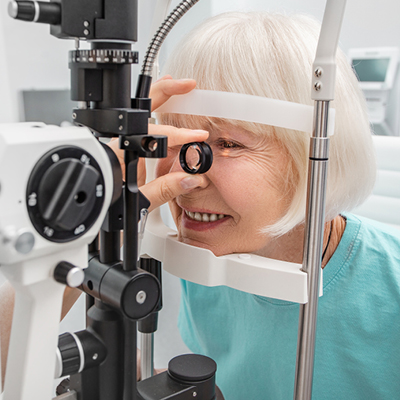What is Diabetic Eye Disease?
Posted August 01, 2022 by James K Salem, MD

According to the Centers for Disease Control and Prevention, approximately one in 10 Americans have diabetes. Diabetes can take a toll on your quality of life, seriously impact your physical and mental well-being and lead to many medical issues, including affecting the eye.
Diabetic eye disease is a group of eye conditions that affect diabetic patients. Patients who maintain high blood glucose for a prolonged period of time can damage the tiny blood vessels located behind the eye; prediabetic individuals with high blood glucose can start this damage before they reach full diabetic levels.
These conditions include diabetic retinopathy, diabetic macular edema (DME), glaucoma and cataract. Unfortunately, none of these diseases show serious symptoms until damage has occurred. While they all have the potential to cause loss in vision or blindness, damage can be mitigated with lifestyle changes and proper maintenance.
Diabetic retinopathy is the most common diabetic eye disease. Prolonged high blood sugar can damage the tiny blood vessels in the retina. Once that damage reaches the level of leaking fluid or showing symptoms of the disease, diabetic retinopathy can begin to distort the vision. If left untreated, new, abnormal vessels begin to form on the surface which can permanently damage the retina and lead to a total loss of vision.
DME is a type of diabetic retinopathy where swelling occurs in the macula area of the retina at the back of the eye. The macula is what you need to read, drive and see clearly and sharply. Poorly managed diabetes can lead to swelling in the macula, causing DME. Over time, this disease can destroy the sharp vision capabilities in the retina, eventually leading to blindness.
In adults, diabetes nearly doubles the risk of glaucoma, a disease that damages the eye’s optic nerve. This group of nerve fibers connects the brain to the eye. If left untreated, it can lead to severe loss of sight.
A cataract clouds the eye’s lens. Diabetics are also more than twice as likely to develop a cataract in their lifetime. Research suggests high glucose levels cause deposits to form in the lenses of the eyes.
Unfortunately, signs and symptoms of diabetic eye diseases don’t usually occur until some damage has occurred. Most patients do not experience any pain or change in vision until damaging nerve growth has reached a large scale. If symptoms do occur, they could include:
- Blurry or wavy vision
- Difficulty seeing colors
- Flashes of light
- Dark, cloudy areas or complete vision loss
- Spots or dark strings
- Inability to get eye to “focus” or see clearly
If you have experienced any of the above symptoms and are a diabetic, consult your primary care physician immediately. Roughly one in three individuals with diabetes over the age of 40 already have some signs of diabetic retinopathy. If caught and treated early, specialists can help reduce the risk of vision loss by 95 percent.
Ways to help prevent diabetic eye disease:
- Maintain healthy blood glucose levels by taking prescribed medication.
- Consume a healthy, plant-based diet.
- Engage in light to moderate physical activity, 3 - 5 times a week.
- If you smoke, quit smoking — this more than triples your chance for developing one of these diseases.
- Lower high blood pressure and/or high cholesterol levels.
- Schedule an annual comprehensive dilated eye exam. This pupil dilation shows your physician the health of your optic nerve and retina and instrumental in preventing and treating diabetic eye disease.
Diabetes support and education is an important part of your healthcare needs. Summa Health has a team approach to meeting the needs of our patients with diabetes. This begins with your primary care provider. Summa Health also has both certified diabetes educators and clinical coordinators in our primary care setting that can assist with education related to lifestyle management and the daily self-management of diabetes. In addition, Summa Health’s endocrinology team specializes in the treatment of different kinds of diabetes.
About the Author
Vitality eNews Sign Up
Receive the Summa Health eNewsletter for the latest health tips, advice and updates.


